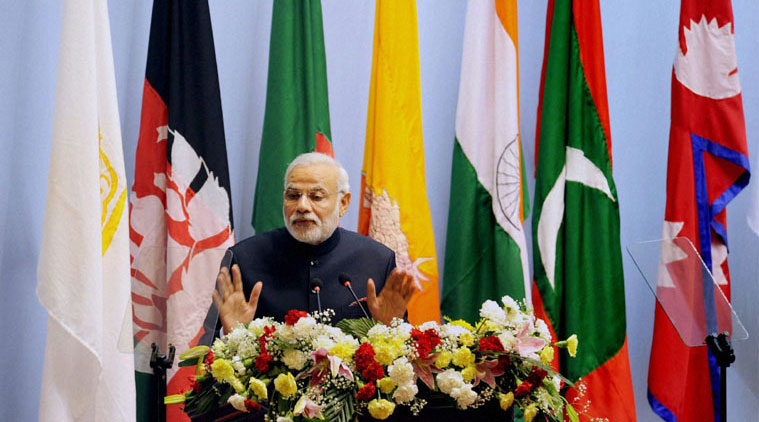The neighbour perhaps the happiest with India at the moment is Bangladesh where the Land Border Agreement for the exchange of enclaves was inked when Modi visited Dhaka in June 2015.
The outreach to Pakistan capped a year for India’s relations with its neighbourhood that opened with the spectacular defeat of Mahinda Rajapaksa in the Sri Lankan presidential election. That defeat worked like a strong muscle relaxant in India-Sri Lanka relations, immediately easing the tensions that had built up over the previous years between the two countries. Rajapaksa alleged an Indian hand in his defeat.
Parliamentary elections in August 2015 saw Rajapaksa defeated a second time, Ranil Wickremesinghe returning as PM after more than a decade of losses, and putting in Temple Trees an economic liberal who believes that Sri Lanka’s economic gateway to the world is through India, and not China. The new Sri Lankan government has not yet cancelled the port city development project off the Colombo shore that Rajapakse had handed to China, but New Delhi is assured that Wickremesinghe will not tilt Sri Lankan foreign policy overly towards Beijing.
During a visit to New Delhi in September, Wickremesinghe said a political settlement with the Tamil minority was a must for his country’s political stability. His government has also accepted the UN war crimes report that called for a full fledged investigation by “special hybrid courts” into “systemic crimes” committed during 2002-2009. Despite political opposition to the idea of hybrid courts, which are “internationalized courts” operating in local territory under special local laws, there are indications that the government will move ahead on this.
With all this, India’s relations with Sri Lanka have come out of hospital. What India would now like is a comprehensive economic partnership agreement with Sri Lanka, which has a better chance of taking shape under Wickremesinghe. During his visit to New Delhi, trade and ramping up defence ties were the focus of the talks between him and Modi.
The improvement in ties with Sri Lanka came none too soon. Maldives, where the political situation has yo-yoed from the bad to the ugly, saw the imprisonment of Mohammed Nasheed, the former President, in March on terrorism charges; in November, President Abdullah Yameen declared an Emergency for a month but was forced to lift it within a week after it sparked worldwide condemnation and threatened the flow of winter tourists to the atoll nation.
The main concern for India, which dropped the ball on Maldives back in 2012 when it refused to stand by the “coup” against Nasheed, was a new piece of legislation in August that permits foreign parties to buy land in the atolls – that has set off China-sized alarm bells in South Block. China is already constructing a bridge over the sea to connect the island on which the airport is located to Male. Minister for External Affairs Sushma Swaraj made a visit to Male in November, after the Emergency was lifted. In the hope of regaining some lost ground, India had remained silent on the Emergency, hoping that quiet diplomacy would succeed with an unpredictable Indian Ocean neighbour.
The neighbour perhaps the happiest with India at the moment is Bangladesh where the Land Border Agreement for the exchange of enclaves finalized by the previous UPA government was inked when Modi visited Dhaka in June 2015. The BJP had protested vociferously against the agreement while in opposition but West Bengal CM Mamata Banerjee had then been the main obstacle. Once in office, the BJP’s opposition to the LBA vanished, and Modi went to Kolkata to bring Mamata on board. In Dhaka, Modi made a speech that took on Pakistan for terrorism, and also reminded it about 1971. It was much appreciated by the Sheikh Hasina government, even though it rubbed Islamabad the wrong way.
The unhappiest is of course Nepal, having displaced Pakistan — at least for the moment — for that title. Imagine Tamil groups creating unrest in Sri Lanka, and India watching from the sidelines, saying the protests are due to Sri Lanka’s internal problems. Of course, India actually did that, in the eighties, playing poker with the Tamils and Sinhalese and getting badly bruised and beaten by both.
Which is why New Delhi’s recent standoff with Nepal is all the more puzzling – India showed zero institutional memory, even of an earlier “official” embargo on Nepal imposed by the Rajiv Gandhi government and its long lasting consequences on India-Nepal relations. Sri Lanka must have watched India’s diktat to Nepal on its Constitution with a sense of been there, seen that.
India’s expression of unhappiness at the absence of provisions for Madhesis in Nepal’s new Constitution came a few weeks ahead of the Bihar elections. No one missed the connection. The blockade of Birgunj, through which many supplies travel to Nepal, has resulted in crippling shortages, especially of cooking fuel, and medicines. China has stepped in to help.
Earlier this month, Nepal finally agreed to address two main demands of the Madhesis — provide for participation in state organs on the basis of proportionate inclusiveness; delimit electoral constituencies on the basis of population. The demand for a separate Madhesi province is to be taken later through an arrangement in the Constitution on the basis of political consensus. Demands for citizenship are also to be addressed through negotiations later.
The Bihar elections behind the BJP, New Delhi now felt free to give its blessing to this. But the Madhesis are still unhappy and the impasse continues. The Indian statement urging “all Nepali political forces to now demonstrate the necessary maturity and flexibility to find a satisfactory solution to the Constitutional issues through constructive dialogue in an agreed time frame,” has not yet received the desired response. The impasse looks set to continue. And the anti-India sentiment is really high.
So far and so different from Sri Lanka, but déjà vu nonetheless.
Source: IndiaExpress








